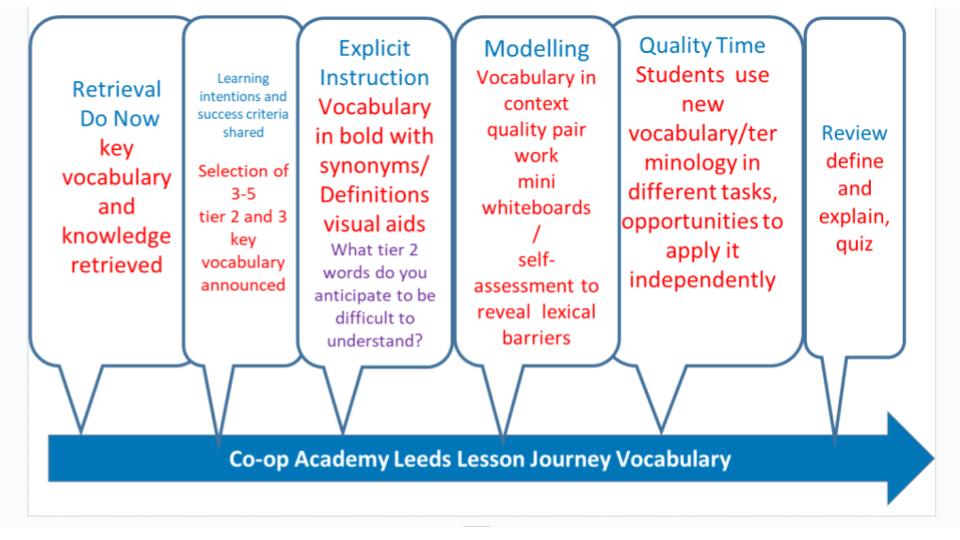Multilingual Students
Mission Statement
Co-op Academy Leeds is a vibrant and inclusive school celebrating the linguistic and cultural identities of our students, and integrating their home languages as assets to enhance their learning experience.Around 80% of students at Co-op Academy Leeds are multilingual, collectively speaking more than 70 different languages. Our aim is to create a learning environment where every student can succeed academically, socially, and linguistically. By embedding explicit language teaching across all subjects, we ensure that lessons are accessible to all, affirming the identities of our multilingual learners while developing their proficiency in English and their home languages.
Our aim is to:
-
Deliver a rich, ambitious, and inclusive curriculum accessible to all multilingual learners.
-
Support all students to achieve their academic potential, irrespective of their English proficiency.
-
Recognise and celebrate students’ home languages to foster confidence and strengthen their linguistic abilities.
-
Provide targeted interventions to accelerate English acquisition and academic readiness.
-
Actively engage families and communities as key partners in supporting student success.
-
Equip staff with high-quality professional development on effective language teaching strategies.
Inclusive Practice and Interventions
For those students with identified very low reading age we offer Fresh Start Interventions and for those students with little or no English proficiency our NFE classes ensure a safe and enjoyable learning environment.
Fresh Start Interventions
These lessons build foundational literacy skills, including phonics, reading fluency, and comprehension, for students with significantly low reading ages.
-
Regular Phonics Sessions: These are focused on instruction , decoding, blending sounds, and building fluency.
-
Small-Group Teaching: Time-limited sessions (8–12 weeks) tailored to individual needs.
-
Engaging Texts: High-interest, age-appropriate materials matched to students’ reading levels.
-
Fluency Practice: Activities like repeated and choral reading to improve speed and confidence.
-
Progress Monitoring: Regular assessments to track improvements in fluency and comprehension.
New to Formal Education (NFE) Programme
It equips students new to formal education with essential English skills, cultural understanding, and readiness for mainstream learning.
-
Intensive English Instruction: Teachers focus on functional language for daily use and curriculum-specific terminology.
-
Numeracy and Practical Subjects: We offer adapted lessons which build core maths skills and reinforce relevant vocabulary.
-
Cultural Orientation: We introduce students to UK school routines, norms, and expectations.
-
Small-Class Environment: We provide nurturing settings to build students’ confidence and resilience.
Integration with Mainstream Curriculum:
-
Adapted Humanities Lessons: Simplified content emphasising key themes, critical thinking, and essential vocabulary.
-
Practical Subjects (IT, PE, Food Technology): Task-based language learning through hands-on activities.
Teaching and Learning Strategies

To support literacy development and English acquisition, staff at Co-op Academy Leeds use the following evidence-based methods:
-
Explicit Vocabulary Teaching:
Teach key subject-specific terms with visuals, examples, and translations where needed.
Focus on root words, prefixes, and suffixes to build word-level understanding.
-
Oral Language Development:
Provide structured opportunities for talk, oral rehearsals, and sentence stems.
Model full-sentence responses in classroom discussions.
-
Scaffolded Writing Tasks:
Use sentence frames and graphic organizers to guide writing at word, sentence, and paragraph levels.
-
Reading Comprehension Support:
Read aloud to students, demonstrating fluency and expression.
Annotate texts to highlight key information and provide visual cues.
Use bilingual resources and translations to support understanding.
Professional Development for Staff
-
Language Awareness Training: Regular CPD on embedding language development in subject teaching and disciplinary literacy.
-
Collaborative Planning: Regular meetings between curriculum leaders and subject teams to adapt materials for multilingual learners.
-
Resource Access: Comprehensive resources, including multilingual glossaries, visual aids, and sentence stems.
Family and Community Engagement
Regular GRT (Gypsy, Roma, Traveller) Meetings: Build trust and address specific community needs.
Multilingual Communication: Provide translated resources to keep families informed and involved
Monitoring and Evaluation
-
Assessment Tools: Use the Bell Foundation Proficiency Scale, EAL Star and reading age tests to track student progress.
-
Classroom Observations: Ensure consistent application of literacy and language strategies across subjects.
-
Student Voice: Gather feedback from students to adapt approaches to their evolving needs.
-
Data Analysis: Review attainment and progress data termly to evaluate the effectiveness of interventions.
